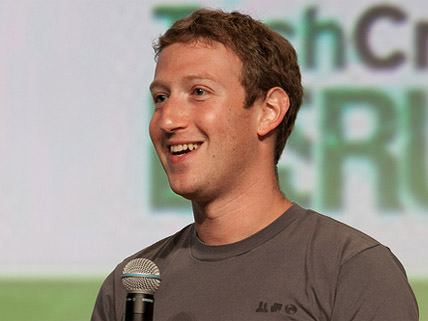Facebook's Next Goal: Bring (Almost) Free, High Quality Education to Rwanda


Much recent news around Facebook has focused on its purchase of WhatsApp, but the social media giant has started another, more charitable initiative. Founder and CEO Mark Zuckerberg announced at the Mobile World Congress in Spain yesterday that Facebook is teaming up with tech and communication companies to bring low-cost, high-quality education to Rwanda.
The initiative, called SocialEDU, will operate out Internet.org, which is a collaboration among Facebook, Samsung, Nokia, Qualcomm, Sweden's Ericcson, Taiwan's MediaTek, and Opera software. In a press release, the partnership lists five components they find necessary to bringing education to underprivileged areas:
- Free content
- Free data
- Affordable smartphones
- Localized, social educational experience
- A government that supports innovation
At the conference, Zuckerberg explained, "there's no clear plan… that this will be good for Facebook, but I can say it will be good for the world." The SocialEDU trial in Rwanda will act as a "blueprint" for future plans.
Although the government already provides taxpayer-subsidized schooling, Rwanda's education system ranks below 166 other countries, having fallen 16 spots since 2009, according to the most recent United Nations data. Part of the problem is that 40 percent of teachers have little profesional experience. By connecting students to higher quality educators, SocialEDU can reduce this institutional shortfall.
Another barrier for Rwanda has been that "school-related costs," even for "basic school materials such as uniforms, books, and pens…pose serious challenges for successful school attendance, performance, and completion" in the country, notes a 2013 study by the Rwanda Education NGO Coordination Platform. Open access to information on digital devices can mitigate students' need for physical textbooks and the financial burden of buying new ones for each subject, each year of school.
And, Facebook's emphasis on socially-oriented environment may be the needed tool to boost the number of Rwandans that continue into secondary education, which right now accounts for only 31 percent of citizens.
This effort may lend itself to solving not only Rwanda's educational troubles, but some of America's as well. While internet-based education, such as massive online open courses (MOOCs), continue to grow more mainstream, they struggle to retain students, even at tech-savvy universities like Stanford. On the popular MOOC site Coursera, an average 96 percent of students quit after only a few weeks. One of Facebook's strongest skills is drawing in, connecting, and holding onto users–to the point of social media addiction–which could keep students engaged.
Editor's Note: As of February 29, 2024, commenting privileges on reason.com posts are limited to Reason Plus subscribers. Past commenters are grandfathered in for a temporary period. Subscribe here to preserve your ability to comment. Your Reason Plus subscription also gives you an ad-free version of reason.com, along with full access to the digital edition and archives of Reason magazine. We request that comments be civil and on-topic. We do not moderate or assume any responsibility for comments, which are owned by the readers who post them. Comments do not represent the views of reason.com or Reason Foundation. We reserve the right to delete any comment and ban commenters for any reason at any time. Comments may only be edited within 5 minutes of posting. Report abuses.
Please to post comments


One assumes that the teachers union in Ruwanda is either weak or non-existent.
I agree. You would think that Zimmerman would try to maybe do something in his own country. To help out locally. Maybe help reeducation here in the US would be a start.
I would guess that because, being the 'predictably irrational' creatures we are, that mental and emotional investment in a "free" course is low. As an experiment, I'd love to see the dropout rate if Coursera charged, say, 5 bucks per course.
Interesting experiment. They could even refund the money upon successful completion of the course.
Udactiy tried that and saw improved engagement.
Cool! Thanks for the info.
I think the more influential factor is the fact that joining is essentially free. Since there's such a low cost to join, many people will do so who won't necessarily complete the course. Why not? It doesn't cost them anything if they end up dropping out later on.
Pretty much. I signed up for two classes so far and only completed the one I was really interested in and thought might actually be helpful to me as an attorney. The other one was more of a casual interest so it was a lot easier to blow it off.
On the popular MOOC site Coursera, an average 96 percent of students quit after only a few weeks.
I had a typical spring on Coursera. I signed up for five courses. I watched the first couple of videos for each. I liked three but only have the time to follow two. I'm not going to complete any of them on time to get a certification. It's not the right time for me. Two of them, I will watch the videos all the way through. I will complete all the HW for one of them in the summer when I have more time, for zero credit of course.
I supposed I've passed more than four percent of what I've taken there. But it would be great to see the article that figures out that people are already massively customising the information on Coursera to their needs.
So...the opposite of public education in Chicago then?
Gotta love that corporate greed lol.
http://www.Anon-Works.com
You Know Who Else wanted to give Rwandans a free quality education?
UN Peacekeepers?
Some guy?
Gotta love that corporate greed lol.
http://www.Anon-Works.com
You Know Who Else wanted to give Rwandans a free quality education?
RishJoMo?
Yes, it's obvious he has a stake in Zuckerberg's project failing.
The new GODZILLA trailer?
http://www.youtube.com/watch?v=vIu85WQTPRc
So, if I go to see the movie, will I actually get to see the monster or is it a low budget flick where they just talk about it?
I love Godzilla movies but this one looks terrible. The should remake Godzilla vs Megalon
In a press release, the partnership lists five components they find necessary to bringing education to underprivileged areas...
God knows how humans ever learned anything before the age of cheap smartphones.
I'm tempted to start a school that's just a few good teachers, some chairs, and a chalk board.
""and a chalk board.""
ETHNOCENTRISM ALERT
Okay, then, some handouts printed with that duplicator process they used to have. Mmmm, duplicator fluid--the smell of larnin'.
Zuckertard already gave $100 MILLION to Newark area schools with nothing to show for it... maybe he should first find out WHY that didn't work before shoveling money at an even more dysfunctional society?
Zuckerberg explained, "there's no clear plan... "
I see a problem already.
There seems to be an item missing from the list of five components necessary to bringing education to underprivileged areas:
Curriculum.
Surfing the web can be an educational experience, for a dedicated student, not for most people.
Also, I'm wondering whether the government will be too keen to find that the use of internet based information makes it difficult to control the message.
If he runs a schools in the same jack-booted manner he runs FB I feel for the students.
Rwanda's education system ranks below 166 other countries, ...
Which is completely consistent with their ranking below 154 other countries in IQ (estimated average 70).
But carry on pretending that it's irrelevant.
yeah this is amzing move if whatsapp could start something like this by which people can get benefit instead of wasting their precious time in updating whatsapp status
Thats actually a nice move , I would suggest using showbox for pc for using educational series on your PC if you want to achieve success.